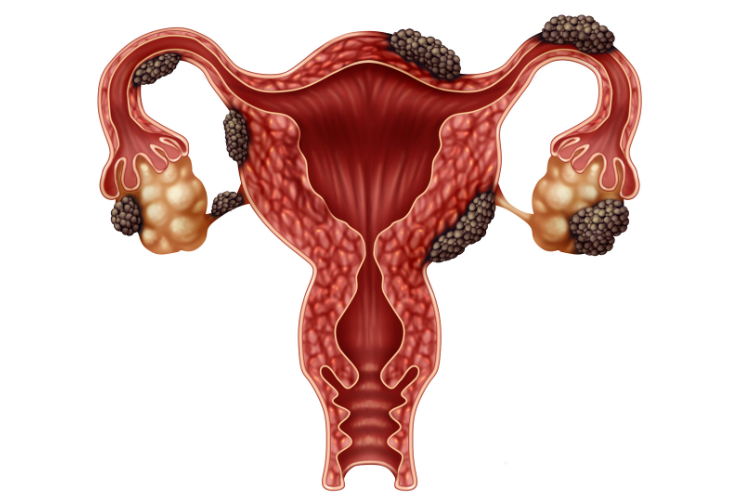Endometriosis
- Home
- Treatments
- Endometriosis

Endometriosis is a chronic and often painful condition that affects millions of women worldwide. It occurs when tissue similar to the lining of the uterus, known as the endometrium, grows outside the uterus in areas like the ovaries, fallopian tubes, and other parts of the pelvic region. At Dr. Rupa Pandra’s clinic, we are dedicated to providing comprehensive care for women with endometriosis, helping them manage symptoms and improve their quality of life.
Understanding Endometriosis
Endometriosis can cause a wide range of symptoms, with pelvic pain being the most common. This pain often coincides with menstrual periods but can also occur at other times, including during intercourse or bowel movements. The severity of the pain does not always correlate with the extent of the condition, meaning some women with mild endometriosis may experience severe pain, while others with more extensive growths may have little to no discomfort.
Common Symptoms
If you have endometriosis, you may experience:
- Severe Menstrual Pain (Dysmenorrhea): Intense cramping and pain during your period that may worsen over time.
- Chronic Pelvic Pain: Persistent pain in the lower abdomen or pelvic area, not limited to menstruation.
- Pain During Intercourse: Discomfort or pain during or after sexual intercourse.
- Heavy or Irregular Periods: Abnormally heavy menstrual bleeding or bleeding between periods.
- Pain with Bowel Movements or Urination: Particularly during menstrual periods.
- Infertility: Difficulty conceiving can be a sign of endometriosis, as the condition can affect reproductive organs.
Diagnosis
Diagnosing endometriosis often begins with a detailed medical history and a physical examination. Imaging tests like ultrasounds can sometimes identify large endometriosis cysts (endometriomas), but the most definitive diagnosis is typically made through laparoscopy. This minimally invasive surgical procedure allows the doctor to view the inside of your abdomen and confirm the presence of endometrial tissue outside the uterus.
Treatment Options
Endometriosis is a complex condition, and treatment plans are tailored to each woman’s specific needs and goals, such as pain relief or fertility preservation.
Medications: Pain relief is often the first step in managing endometriosis. Nonsteroidal anti-inflammatory drugs (NSAIDs) can help reduce inflammation and pain. Hormonal therapies, including birth control pills, gonadotropin-releasing hormone (GnRH) agonists, and progestin therapy, are used to control the hormonal fluctuations that trigger the growth of endometrial tissue.
Minimally Invasive Surgery: For women with moderate to severe endometriosis or those seeking fertility, laparoscopic surgery may be recommended. This procedure involves removing or destroying endometrial implants, which can help alleviate pain and improve fertility. Our skilled surgeons are experts in performing these delicate procedures with precision and care.
Lifestyle and Supportive Care: Lifestyle changes, such as regular exercise, a healthy diet, and stress management, can help manage symptoms. We also offer supportive care, including counseling and physical therapy, to help women cope with the emotional and physical challenges of living with endometriosis.
Managing Endometriosis and Fertility
Endometriosis can impact fertility, but many women with the condition can still conceive, either naturally or with the help of fertility treatments. Our team works closely with women who are trying to conceive, offering tailored fertility treatments and support to help them achieve their dream of motherhood.
